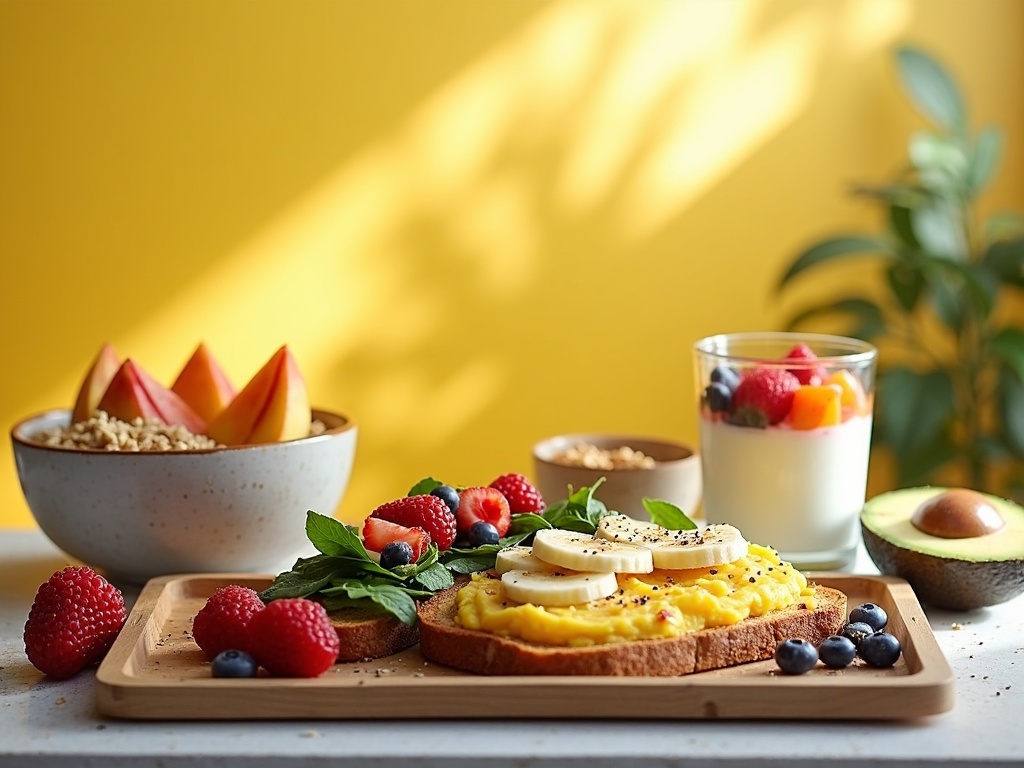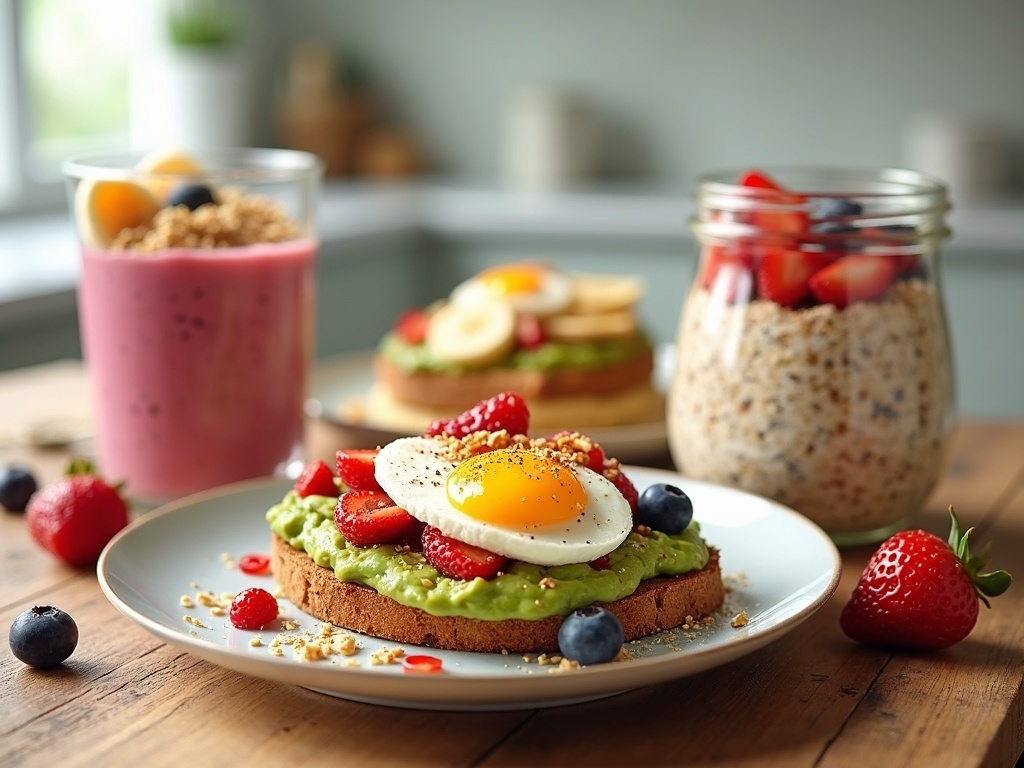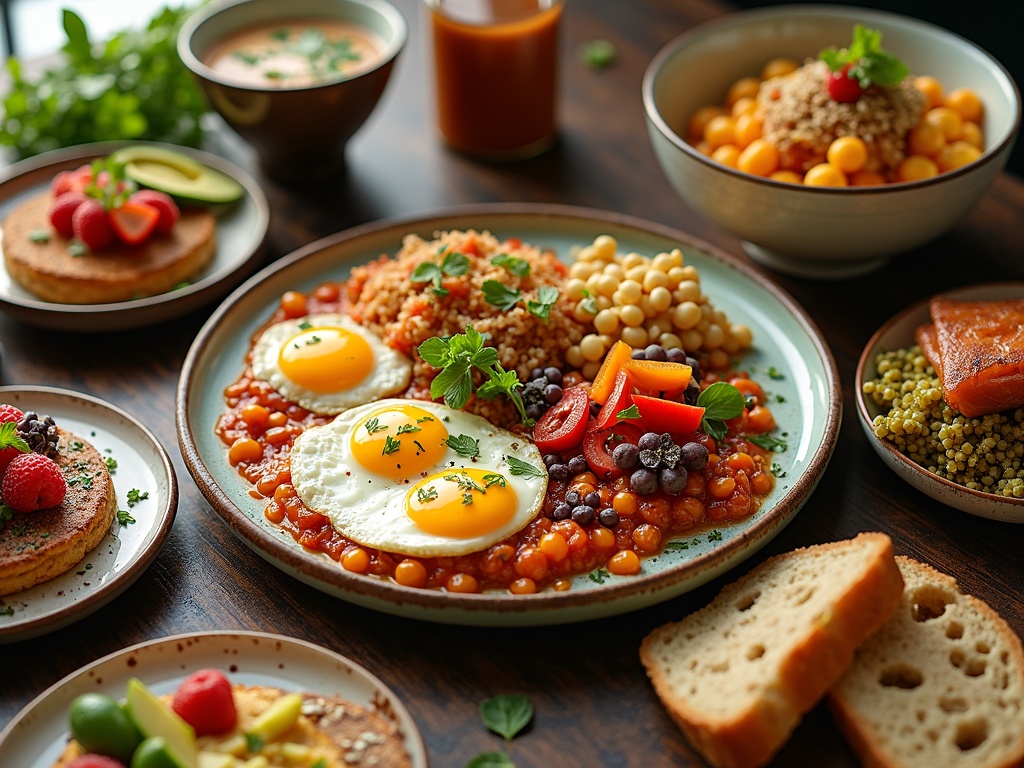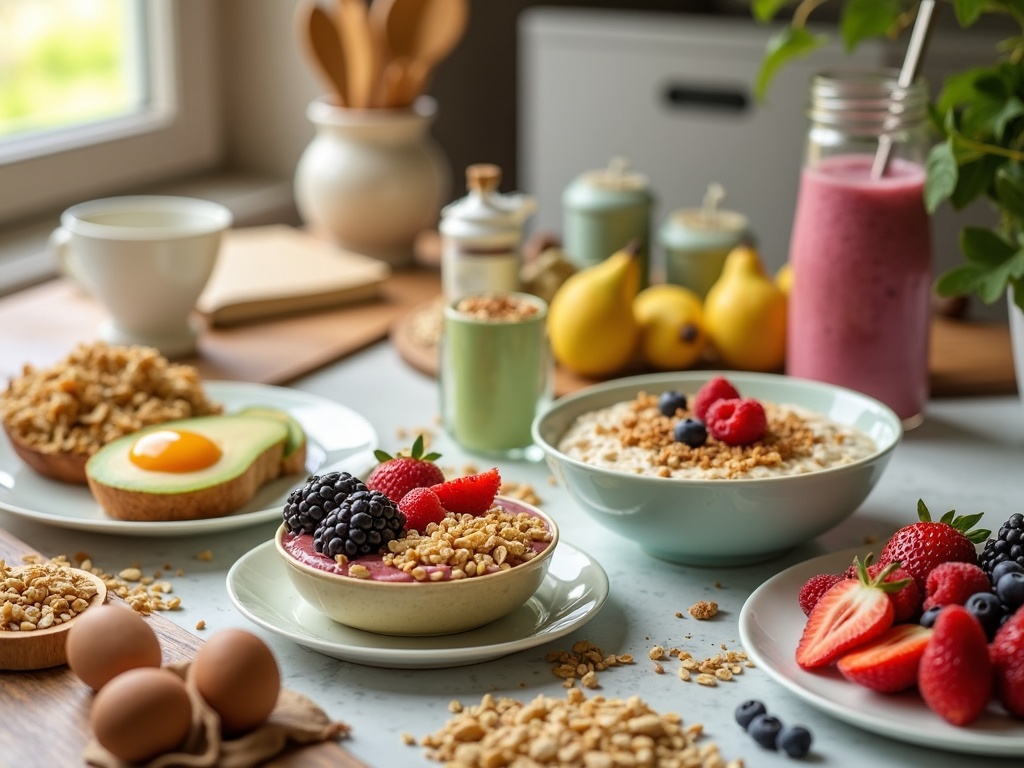Starting my day with a nutritious breakfast creates a foundation for sustained energy and optimal brain function throughout the day. Research shows that regular breakfast eaters typically maintain healthier weights and better nutritional profiles, while skipping this important meal can lead to increased obesity risk and blood sugar fluctuations.
Find In This Article
Key Takeaways
- Balanced breakfasts should include a mix of protein, healthy fats, fiber, and complex carbohydrates for sustained energy.
- Quick options like smoothie bowls, avocado toast, and overnight oats provide nutrition without requiring significant morning preparation time.
- Common breakfast mistakes include skipping the meal entirely, consuming sugary cereals, and carbohydrate overload without balancing protein and fats.
- Breakfast choices can be adapted for various dietary needs including vegan, gluten-free, and other specialized requirements.
- Drawing inspiration from global breakfast traditions can introduce variety and additional nutritional benefits to your morning routine.
Why Breakfast Matters for Your Health
Starting your day with a nutritious meal sets the tone for your entire day. I’ve found that making time for breakfast foods in the morning truly impacts how I feel and perform throughout the day.
Breakfast and Nutritional Health
The statistics paint a clear picture – approximately 10% of American children and 15% of adults skip breakfast daily. This missed opportunity has real consequences. Studies show that breakfast eaters typically maintain healthier weights and have better nutritional profiles overall. When I consistently eat healthy things to eat for breakfast, I notice improved energy levels that last until lunchtime.
Research has established a direct link between eating breakfast and enhanced cognitive function. This means better concentration, memory, and problem-solving abilities – essential skills whether you’re heading to school, work, or tackling daily tasks. I’ve experienced this benefit firsthand, noticing sharper focus on mornings when I’ve taken time for a best healthy breakfast compared to days when I rush out without eating.
The Consequences of Skipping Breakfast
Regularly skipping your morning meal carries several health risks worth considering:
- Increased obesity risk – Studies show that breakfast skippers often consume more calories later in the day.
- Higher blood sugar issues – Missing breakfast can lead to larger blood glucose fluctuations.
- Reduced metabolism – Your body needs food to kickstart your metabolic processes.
- Nutrient deficiencies – It becomes harder to meet daily vitamin and mineral requirements.
- Mood disturbances – Low blood sugar from fasting can affect your emotional stability.
Beyond these immediate effects, establishing a routine with healthy breakfast foods promotes better overall dietary habits throughout the day. I’ve noticed that when I start with a balanced breakfast, I’m more likely to make nutritious choices for lunch and dinner as well.
The good news is that incorporating healthy breakfast options doesn’t need to be complicated or time-consuming. Simple combinations of protein, healthy fats, fiber, and complex carbohydrates can provide everything your body needs to start the day right. Even on busy mornings, I prioritize easy healthy breakfast choices that can be prepared quickly or even the night before.
Essential Ingredients for a Power-Packed Breakfast
Starting my day with the right breakfast ingredients makes all the difference in my energy levels and focus. I’ve found that incorporating specific food groups creates the perfect balance for sustained energy and satisfaction throughout the morning. When I choose healthy things to eat for breakfast, I make sure to include a mix of these essential components.
Foundation Foods for Morning Energy
Whole grains form the perfect base for any energizing breakfast. Oatmeal stands out as my top choice because it contains beta-glucan, a soluble fiber that helps maintain steady blood sugar levels. I can prepare it overnight for convenience or cook it fresh in the morning. Whole grain bread toasted with toppings offers another excellent option that provides lasting energy without the mid-morning crash that refined carbohydrates cause.
Protein sources are crucial for keeping hunger at bay until lunchtime. Eggs remain one of the most versatile and complete protein sources available. Whether scrambled, boiled, or in an omelet with vegetables, they provide essential amino acids that support muscle maintenance. Plant-based alternatives like nut butters spread on toast or mixed into oatmeal deliver both protein and healthy fats. When I’m looking for variety, lean turkey or chicken can make satisfying breakfast foods that break the traditional morning meal mold.
Fruits add natural sweetness, vital vitamins, and minerals to breakfast. Bananas offer potassium and natural carbohydrates that fuel morning workouts. Berries pack powerful antioxidants that fight inflammation while adding minimal sugar. Apples provide fiber that supports digestive health and pairs perfectly with nut butters for a quick meal. Adding fruit to my healthy breakfast foods ensures I get essential nutrients without artificial sweeteners.
Smart Additions for Nutritional Balance
Dairy or dairy alternatives contribute calcium and additional protein to morning meals. Greek yogurt stands out with its high protein content and probiotics that support gut health. I often use it as a base for fruit and granola or blend it into smoothies. Cottage cheese offers another protein-rich option that pairs well with both sweet and savory toppings. For those avoiding dairy, fortified almond milk or soy milk provides similar benefits in best healthy breakfast recipes.
Healthy fats deserve a place in your morning routine for optimal brain function and satiety. These include:
- Avocados that provide monounsaturated fats and fiber
- Nuts like almonds and walnuts containing omega-3 fatty acids
- Seeds such as chia, flax, and pumpkin that add texture and nutrients
- Olive oil drizzled over savory breakfast bowls
The key to creating healthy breakfast options lies in balancing these components. I aim for a combination that includes protein for muscle repair, fiber for digestion, healthy fats for brain function, and complex carbohydrates for energy. This balance prevents blood sugar spikes and keeps me feeling full longer.
When time is limited, I focus on easy healthy breakfast combinations that still maintain this balance. A smoothie with protein powder, frozen berries, nut butter, and spinach takes just minutes to prepare but contains most essential nutrients. Overnight oats prepared the evening before need only a quick topping of fresh fruit in the morning. Even toast with avocado and an egg provides the perfect nutrient balance when I’m rushing.
By prioritizing these power-packed ingredients, I’ve transformed my morning routine and energy levels. The right breakfast doesn’t need to be complicated—it just needs to include the right elements in balanced proportions.

Quick and Nutritious Breakfast Recipes
Starting my day with a proper breakfast has completely transformed my morning routine. I’ve collected some of my favorite quick recipes that combine convenience with nutrition to help you fuel up properly without spending hours in the kitchen.
Ready in Minutes: 3 Foolproof Breakfast Recipes
A smoothie bowl makes for a refreshing and customizable healthy breakfast option that only takes 5 minutes to prepare. I start with 1 frozen banana, ½ cup frozen berries, ¼ cup Greek yogurt, and a splash of milk. Blend until smooth but still thick enough to eat with a spoon. Pour into a bowl and top with 1 tablespoon each of granola, chia seeds, and fresh fruit. The beauty of smoothie bowls is their versatility—you can swap in different fruits, add protein powder, or use plant-based milk alternatives depending on your preferences.
Avocado toast has become my go-to nutritious breakfast food for busy mornings. I toast a slice of whole grain bread, then spread half a ripe avocado on top. My favorite seasoning combinations include:
- A classic sprinkle of salt, pepper, and red pepper flakes;
- A Mediterranean twist with za’atar and lemon juice;
- A protein boost with a poached egg on top.
This takes about 10 minutes total, including the time to poach an egg if you’re adding one.
For those who need a grab-and-go option, overnight oats have become a staple breakfast food in my routine. The basic formula I follow is ½ cup rolled oats, ½ cup milk (dairy or plant-based), and 1 tablespoon chia seeds. From there, I add sweeteners like 1 teaspoon honey or maple syrup and flavorings such as ½ teaspoon vanilla extract or cinnamon. The prep takes just 5 minutes the night before, and in the morning, I add toppings like fresh fruit, nuts, or a spoonful of nut butter. The result is a creamy, ready-to-eat nutritious breakfast with zero morning prep time.
Each of these quick breakfast recipes offers different storage options. Smoothie bowls are best enjoyed immediately, but if needed, you can store the blended base in an airtight container for up to 24 hours in the refrigerator—just add toppings right before eating. Avocado toast doesn’t store well once assembled, but you can prep components ahead: mash avocado with a bit of lemon juice to prevent browning and refrigerate in an airtight container for up to a day.
Overnight oats are the storage champions—they’ll keep in the refrigerator for up to 5 days in sealed jars, making them perfect for weekly meal prep. I usually make 3-4 jars on Sunday evening, using different mix-ins for variety throughout the week. For the best texture, add crunchy toppings like nuts or granola just before eating.
These balanced breakfast options provide a mix of complex carbohydrates, healthy fats, and proteins to keep energy levels steady until lunchtime. I’ve found that spending just a few minutes on breakfast preparation yields significant benefits in terms of morning energy, focus, and overall nutritional intake—making it well worth the minimal time investment.

Common Breakfast Mistakes to Avoid
I’ve noticed many people struggle with breakfast decisions that end up affecting their entire day. Making thoughtful choices first thing in the morning sets the tone for balanced eating later on.
Breakfast Pitfalls and Solutions
Skipping breakfast entirely is perhaps the most common mistake. When you miss that morning meal, you’re more likely to overcompensate with larger portions or unhealthy snacks later. Your body, seeking quick energy after extended fasting, often craves high-calorie, low-nutrient foods. Instead of skipping, consider easy healthy breakfast options that can be prepared quickly.
Another frequent misstep is relying on sugary cereals for your morning fuel. While they might taste delicious, these options cause rapid blood sugar spikes followed by crashes that leave you hungry and irritable by mid-morning. For better alternatives, explore healthy breakfast foods that provide sustained energy without the sugar crash.
Carbohydrate overload is a breakfast trap many fall into. Toast, bagels, and pastries without protein or healthy fats lead to quick hunger returns and energy dips. Balance is key – pairing carbs with protein and healthy fats creates staying power. I recommend checking out breakfast foods that offer this crucial balance.
To solve these common mistakes, I suggest:
- Preparing make-ahead options like overnight oats or egg muffins
- Keeping quick protein sources handy (Greek yogurt, nuts, or boiled eggs)
- Focusing on fiber-rich foods that promote fullness
- Including at least one fruit or vegetable with breakfast
- Limiting added sugars to avoid energy crashes
Meal planning prevents poor breakfast choices when you’re rushed. Take 30 minutes weekly to map out best healthy breakfast options and prep ingredients. Stock your kitchen with versatile healthy breakfast options that can be mixed and matched.
Remember that breakfast doesn’t have to be traditional. Leftovers, savory grain bowls, or even healthy things to eat for breakfast like a handful of nuts with fruit can provide the nutrition you need. The key is making intentional choices rather than grabbing whatever’s convenient or skipping altogether.
Breakfast Ideas for Every Diet
Finding suitable breakfast options to match your dietary needs doesn’t have to be a challenge. I’ve gathered some fantastic morning meal ideas that cater to various diets while still delivering flavor and nutrition.
Plant-Based and Specialized Diets
Vegan breakfasts have come a long way from plain toast and fruit. Tofu scrambles make an excellent protein-rich alternative to eggs – simply crumble firm tofu in a pan with turmeric for color, nutritional yeast for flavor, and your favorite veggies. Legume-based dishes like chickpea flour pancakes (also known as socca) provide substantial protein to start your day right.
For those avoiding gluten, nutritious morning meal options include quinoa bowls topped with fruits, nuts, and a drizzle of honey. Buckwheat, despite its name, is actually gluten-free and makes delicious pancakes with a nutty flavor. Oatmeal can also be gluten-free if you purchase certified gluten-free oats.
Adapting recipes for dietary restrictions is straightforward with these tips:
- Replace dairy milk with almond, oat, or coconut alternatives
- Swap honey for maple syrup in vegan recipes
- Use chia or flax eggs instead of chicken eggs (1 tbsp ground seeds + 3 tbsp water)
- Choose certified gluten-free oats for celiacs
Global Breakfast Inspirations
I’ve found that healthy breakfast foods from around the world offer exciting flavors while delivering impressive nutrition. Middle Eastern shakshuka features eggs poached in a spiced tomato sauce and is often served with bread for dipping. This dish delivers protein and lycopene-rich tomatoes in one satisfying meal.
Latin American breakfast bowls built on black beans and avocado provide heart-healthy fats and fiber. Japanese breakfasts typically include miso soup, rice, fish, and pickled vegetables – creating a savory start with probiotics and protein.
Chia pudding, popularized in Mexican cuisine as “agua de chia,” has become a modern simple nutritious breakfast staple. These tiny seeds expand in liquid to create a pudding-like consistency packed with omega-3 fatty acids and fiber.
Indian cuisine offers protein-rich options like chickpea flour pancakes (chilla) that pair perfectly with chutney for a savory morning meal. Meanwhile, Scandinavian breakfasts featuring rye bread with toppings like smoked salmon deliver omega-3s and whole grains.
The beauty of exploring morning meal traditions from different cultures is discovering how diverse and nutritionally balanced breakfast can be when we look beyond standard Western options.

Sources:
Food Research and Action Center – “Breakfast: The Importance of a Balanced Breakfast”
Nutrition Today – “The Role of Breakfast for Health and Nutrition”
Annals of Nutrition and Metabolism – “Eating Breakfast: A Review of the Benefits”

